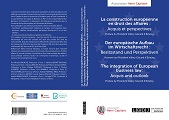This initiative is a strong commitment in favour of European integration, and the promotion and convergence of continental law Europe-wide.
The European Business Code
 The Civil Law Initiative supports the drafting of a European Business Code, which is intended to unify business law in the countries of the European Union. The aim is to restore the law to the heart of European integration and give a sense of direction to the single currency, by encouraging the free movement of goods and capital through the convergence of the business laws of the Member States, the immense majority of which are governed by continental law, thereby ensuring greater comprehensibility and greater security for the regulatory framework that applies to the economic actors.
The Civil Law Initiative supports the drafting of a European Business Code, which is intended to unify business law in the countries of the European Union. The aim is to restore the law to the heart of European integration and give a sense of direction to the single currency, by encouraging the free movement of goods and capital through the convergence of the business laws of the Member States, the immense majority of which are governed by continental law, thereby ensuring greater comprehensibility and greater security for the regulatory framework that applies to the economic actors.
The dispersal of powers between the Union and the Member States, and the principles of subsidiarity and proportionality have been powerful brakes on real integration of business law at European level. The proposed European Business Code is a citizens' initiative that offers a response to this deficiency, which has been highlighted by the work of the academics and legal practitioners of the Association Henri Capitant, who have reviewed this field with the support of the Civil Law Initiative in their work entitled The integration of European business law: acquis and outlook, which has a preface by President Valery Giscard d'Estaing.
This proposal, which promotes the legal and judicial tradition of “Romano-Germanic” law at European level, is based on the belief that the convergence of business law will foster stability and make Europe a more attractive place to do business. The economic regulations that structure the market are one of the variables of investment.
This ambitious project falls into two strategic phases:
At the first stage, preparatory work will be carried out by the members of the Civil Law Initiative and the Association Henri Capitant, with the aim of ultimately drafting a European Business Code. Two co-directors, one French and one German, will be tasked with guiding each of the 12 thematic groups of European experts who will have to draft the different sections of the Code, following the plan laid down in the above-mentioned review and after consultation of the individuals and bodies concerned (legal professions, companies, ministries, etc.). This work will be spread over three years.
At the same time, all of the parties involved will be promoting this project to the European institutions and different ministries of Justice in the countries of the European Union. The aim is to have the new Code incorporated into European law by the appropriate authorities, at a later stage.
The European Commission has already welcomed this initiative by officially observing that there is a need for a European Business Code in its White Paper on the future of Europe, which was published on 1 March 2017. The project is mentioned on page 21 of the White Paper:
“A group of countries works together and agree on a common “Business Law Code” unifying corporate, commercial and related domains of law, helping businesses of all sizes to easily operate across borders.”
A Franco-German meeting with all the co-directors of the 12 thematic groups was held on Wednesday, 29 March 2017 at the Civil Law Initiative, to plan the various stages of the preparatory work.
Civil Law Initiative
Email: contact@droitcontinental.org
www.fondation-droitcontinental.org
Publié le 10/04/2017, 13h11















